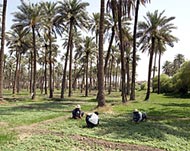Traditional Asian, African cures work
Traditional plant remedies used to treat diabetes, fight cancer, or heal wounds in Asia and Africa have proven scientifically effective, according to new research.

Indian diabetes treatments, Ghanaian wound-healing agents and cancer treatments used in China and Thailand have “real benefits”, according to a statement released on Tuesday at the British pharmaceutical conference in Manchester.
“The findings will help local people identify which plants to recommend and may lead to potential new compounds for pharmaceutical use,” researchers from King’s College London were quoted as saying.
The researchers said extracts from India‘s curry-leaf tree showed a significant capacity to inhibit the digestive enzyme pancreatic alpha-amylase which breaks down dietary starch into glucose, the statement said.
Blood glucose
“A patient with diabetes does not produce enough insulin to cope with rapid rises in blood glucose levels. Slowing the rate of starch breakdown, by blocking alpha-amylase, can lead to a more even trickle of glucose into the bloodstream from the intestine,” it said.
 |
|
The findings may help focus on |
The researchers are now looking to identify the specific active compounds in the plant, it added.
King’s College is also working with Kwame Nkrumah University of Science and Technology in Ghana to investigate the properties of some plants used by the Ashantis, one of the largest ethnic groups in the west African country.
Antibacterial
During their research, an extract of Commelina diffusa, also known as climbing dayflower, was “shown to have both antibacterial and antifungal activity,” Peter Houghton, head of the King’s College research team, was quoted as saying.
|
“This activity indicates that the plant is useful in helping wounds to heal and stopping them getting infected” Peter Houghton, |
“This activity indicates that the plant is useful in helping wounds to heal and stopping them getting infected,” he said.
The statement also said that plants used in Thai and Chinese traditional medicine for treatment of cancer – also studied by the King’s College team – “do appear to have anticancer activity”.
“With the Thai plants, the best results were found with Ammannia baccifera, an aquatic weed. Work is now under way to isolate and purify the active compounds present in the plant,” it added.
The most promising of the Chinese products was the plant Illicium verum, it said.